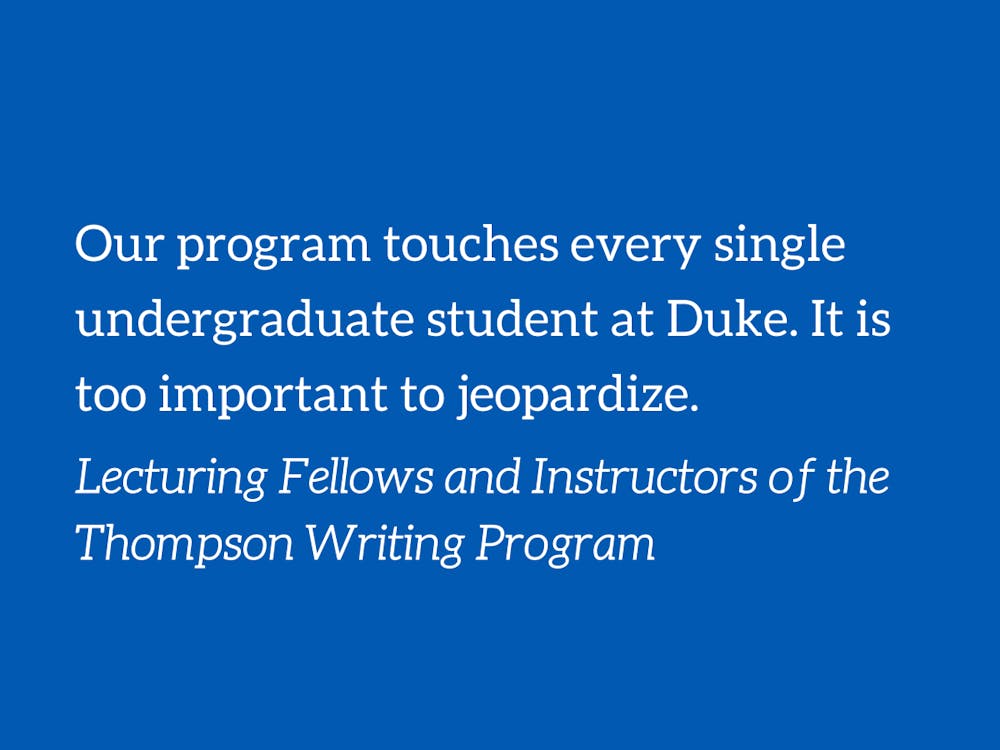As Writing 101 instructors, we are writing to raise awareness about an issue that threatens our jobs at Duke, as well as our ability to provide our students with the high-quality education they expect. We care deeply about students’ experience in our classes, not only because of the writing instruction that we offer, but also because the small-group setting of Writing 101 allows first-year students to get to know professors, receive personal attention and feedback and build connections that often last their entire career at Duke.
As Lecturing Fellows, we are not hired as tenure-track faculty. Rather, the Thompson Writing Program consists of faculty with a range of different job conditions. At present, some of us have three-year appointments that are renewable contingent on successful performance reviews, while others have non-renewable appointments that are term-limited. Those who have non-renewable appointments must leave the university at the end of their first appointment terms. They have no opportunity to continue teaching Writing 101 at Duke, regardless of the quality of their teaching or work at Duke.
The Duke Faculty Union believes that all faculty should have the option to receive renewable three-year appointments. In the Thompson Writing Program, non-renewable faculty are experts in their subject areas, hold PhDs, have extensive prior teaching experience and maintain active research profiles. All of these contribute to their effectiveness in teaching Writing 101 at Duke. They also design unique courses that are not offered by others in the department, increasing the diversity of choices for first-year students. Despite these qualifications and the quality of their work, these Lecturing Fellows will lose their positions as teachers of Writing 101 at the end of their appointment terms, even in the context of a global pandemic that has left the academic job market in shambles.
This issue is not only a matter of justice; it also affects students, because teaching experience is directly related to positive student outcomes. When instructors have the option to stay at Duke long-term, they have the opportunity to build mentoring relationships that outlast the terms of a single semester. Writing 101 instructors provide letters of recommendation for Duke students to pursue not only study abroad and summer research experiences, but also graduate school, medical school, law school and competitive scholarships like the Fulbright and the Rhodes. As Writing 101 faculty with renewable appointments spend more time at Duke, they get to know the institution more deeply and are better able to guide students to university resources. They serve as House Course mentors and on honors thesis committees. They are active in advising, faculty working groups, collaborative research and publications and partnerships with the Durham community and other local universities.
Beginning in the 2021-2022 academic year, the university has planned further changes that will negatively impact student learning. In order to decrease the number of Writing 101 faculty, the university is implementing an increase in the size of all Writing 101 classes from 12 to 15 students beginning in Fall 2021. For students, we are concerned that this change will affect the quality of your education. Fewer Writing 101 faculty will decrease the number and diversity of course offerings for students. There will be fewer offerings to choose from each semester, and students will have less opportunity to choose a course that matches their disciplinary interests. Additionally, the Writing 101 experience will be less individualized. Instructors will not be able to provide the same level of attention to each student, and they will not be able to get to know each student as deeply. The intimate setting of our classes is crucial to our ability to provide individualized feedback, responses, experiences, support and services to students.
In the four years since most Lecturing Fellows won renewable contracts, the Thompson Writing Program has earned national and campus recognition for their exceptional classes. For the last two years, Duke has ranked in the top 3 in U.S. News and World Report’s ranking of “Colleges with Great Writing Programs,” most recently finishing above Ivy League institutions like Harvard and Princeton. In 2019, students voted Writing 101 the top “Must-Take Class” at Duke. We want to keep our national standing as one of the best writing programs in the United States.
Now, Duke is jeopardizing the quality of our program and the existence of our jobs. At present, the university plans to continue to restrict many instructors in our program to non-renewable appointments, giving those instructors no job security during a global pandemic. In addition, there is no plan to revert Writing 101 courses back to 12-student caps after the pandemic budgetary shortfalls have recovered. As undergraduate tuition remains at the same or higher levels than before the pandemic, we do not want our program to offer less to future students. We want to keep our current, excellent faculty, as well as what they have to offer. Our program touches every single undergraduate student at Duke. It is too important to jeopardize.
We hear from many former students about what a difference their Writing 101 experience made to their first-year experience. We want to offer the same experience to future Duke undergraduates.
Signed,
Michael Accinno
Lisa Andres Cole
Brenda Baletti
Paolo Bocci
Jamie Browne
Rene D. Caputo
Kevin Casey
Mike Dimpfl
Nathan Kalman-Lamb
Seth Stein LeJacq
Leslie Maxwell
Kerry Ossi-Lupo
Emily Parks
Sarah Parsons
Marion Quirici
Lindsey Smith
Sandra Sotelo-Miller
Margaret Swezey
Susan Thananopavarn
Andrew Tharler
Sarah Town
Matt Valnes
Haleema Welji
Miranda Welsh
Amanda Wetsel
Get The Chronicle straight to your inbox
Signup for our weekly newsletter. Cancel at any time.

